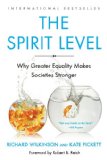Summary | Excerpt | Reviews | Beyond the Book | Readalikes | Genres & Themes | Author Bio
Why More Equal Societies Almost Always Do Better

Critics' Opinion:
Readers' Opinion:
First Published:
Dec 2009, 352 pages
Paperback:
Apr 2011, 352 pages
 Book Reviewed by:
Book Reviewed by:
Jo Perry
Buy This Book
Aware of some of the political sensitivities round inequality, we thought we should also check our results against someone else’s measure of wellbeing. The UNICEF Index of Child Wellbeing in Rich Countries, which combines data on 40 different aspects of children’s lives, seemed like a good alternative yardstick. It includes everything from whether children feel they can talk to their parents, to immunization rates, to measures of bullying at school. We found that child wellbeing too, was strongly associated with the size of the gap between rich and poor, but unrelated to national levels of average income per person.
This research, outlined in our book, The Spirit Level: Why Greater Equality Makes Societies Stronger (Bloomsbury, 2009), brings together many years of our own and other people’s research devoted to trying to understand why some rich countries are healthier than others. There are now over 200 studies of income inequality and health. A recent study covering 60 million people concluded that inequality affects population health, even after adjusting for individual incomes in each society. There are also many studies showing that homicide rates are lower in more equal countries.
Throughout the centuries, there have always been those who have believed that inequality is divisive and socially corrosive. That intuition seems to be borne out by our data. In the more unequal countries and US states, only about 15 or 20 percent of the population feel they can trust others, compared to around two-thirds in the more equal ones. More equal societies are also more cohesive, with stronger community life. Coupled with the evidence on violence, this confirms that inequality damages the social fabric of society. If you have to walk home alone late at night, you’d feel easier about it in a more equal society.
Our interpretation of these findings is that bigger income differences lead to bigger social distances across the status hierarchy, increasing feelings of superiority and inferiority, and adding to status competition and status insecurity. Some of the causal links between greater inequality and adverse outcomes are well known: the physiological effects of low social status, lack of social support and of stress in early childhood are now understood: chronic stress has profound effects on all biological systems. Similarly, the reason why violence is more common in more unequal societies is because high levels of inequality make status even more important, and the most common triggers to violence are, of course, disrespect, loss of face and humiliation.
But there is a more fundamental explanation of why we are so sensitive to inequality. Because individuals within any species have the same needs, the greatest potential for conflict is almost always between members of the same species. The 17th century philosopher Thomas Hobbes regarded this as the central problem of politics. Because we all have the same needs, the competition “of each against all” would, in the absence of a sovereign power to keep the peace, make life “nasty, brutish and short”. But, of course, unlike other species, human beings also have the potential to be each other’s best source of cooperation, assistance, love and learning.
This is why other people can be heaven or hell – our best sources of security and support, or our most feared rivals. Everything depends on the quality of the social relationships between us. Sharing food is deeply symbolic because of the stark opposition between reciprocity and competition over access to necessities. Throughout both human history and pre-history, gifts have been symbols of friendship and in some societies refusing a gift is close to a declaration of war. Because gifts assert that giver and receiver recognize each others needs and will not compete over access to scarce resources, the exchange of gifts affirms friendship, sharing and reciprocity.
Excerpted from The Spirit Level by Kate Pickett and Richard Wilkinson. Copyright © 2010 by Kate Pickett and Richard Wilkinson. Excerpted by permission of Bloomsbury. All rights reserved. No part of this excerpt may be reproduced or reprinted without permission in writing from the publisher.





The Flower Sisters
by Michelle Collins Anderson
From the new Fannie Flagg of the Ozarks, a richly-woven story of family, forgiveness, and reinvention.

The House on Biscayne Bay
by Chanel Cleeton
As death stalks a gothic mansion in Miami, the lives of two women intertwine as the past and present collide.

The Funeral Cryer by Wenyan Lu
Debut novelist Wenyan Lu brings us this witty yet profound story about one woman's midlife reawakening in contemporary rural China.
Your guide toexceptional books
BookBrowse seeks out and recommends the best in contemporary fiction and nonfiction—books that not only engage and entertain but also deepen our understanding of ourselves and the world around us.